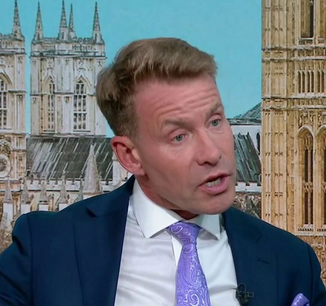We need to talk about David Bull

I was reluctant to write this, as I noted in one of my blogs yesterday about the BBC, these people already get far too much airtime and column inches. https://www.tetleystldr.com/tetleystldr-blog/we-need-to-talk-about-the-bbc However, given the dangerous consolidation of power and narrative around Reform UK, unfortunately scrutiny is more necessary than ever.
When David Bull replaced Zia Yusuf as chair of Reform UK Ltd this week, few outside the populist right might have recognised his name. But he has political form. A former MEP for the Brexit Party, ex-TV doctor, and media-friendly face of hardline anti-woke outrage, Bull has long been a reliable lieutenant to Nigel Farage. Behind his polished media presence lies a deeper problem: Bull’s rise signals a sharpening of Reform UK’s authoritarian populism, wrapped in slick PR, fuelled by opaque money, and weaponised through culture war theatrics. This isn’t about a new kind of politics. It’s the same old elite-backed, xenophobic, anti-worker agenda with a fresh lick of Farage-flavoured gloss, and Bull makes a perfect frontman.
Bull’s political career is a case study in style over substance. Elected as an MEP for the Brexit Party in 2019, Bull spent most of his time in Strasbourg decrying the institution that paid his salary. In one viral tweet, he moaned about the 'insanity' of having to take four trains to reach the European Parliament, a manufactured outrage that showcased his misunderstanding of the Strasbourg-Brussels split and the role of an MEP. Beyond the soundbites, Bull achieved little in legislative terms. Like many of his Brexit Party colleagues, he treated the Parliament not as a forum for democratic debate but as a stage for domestic grievance politics. Parliamentary committee work? Legislative engagement? absent. Bull was there to film rants, not write laws. His exit from the EU stage coincided with the Brexit Party’s rebranding into Reform UK Ltd: an outfit built more around Farage’s media stardom than coherent policy. But Bull stuck around, eventually becoming deputy leader and now chair.
He was born into a comfortably middle-class family in Farnborough in 1969. He attended Ipswich Prep School and Framlingham College, an independent institution. His parents were reportedly supportive of his ambition from an early age, and the privileges of private education laid the groundwork for a life in the media and public eye. He studied medicine at Imperial College London, later moving into TV presenting, a trajectory possible only with the financial buffer and confidence that elite schooling often bestows.
Although Bull rarely discusses his personal wealth, his media career, spanning BBC, ITV, and Channel 5, along with political appointments and connections to high-profile donors suggest a lifestyle far removed from the economic realities of the voters he now claims to represent. Like many in Reform UK’s upper ranks, he is part of an economic class that has little genuine connection to the financial precarity gripping large swathes of Britain. He perfectly fits into the mould of a hawkish Thatcherite far right, started by tories, pushing tory identity dogma and comprising of ex-tories. In fact, he was actually selected to stand as a Conservative PPC for Brighton Pavillion in the 2010 General election, but later withdrew.
One thing the far-right can claim to be is consistent in their lack of empathy. Bull’s politics are clearest not in white papers but in one-liners. In 2023, on Sky News, he declared that anyone who turns down job offers three times should lose their benefits: "If they choose not to work, then frankly, they can eat grass". The backlash was immediate. The interviewer responded, "So let them starve themselves to death?" But Bull doubled down, making clear that his version of conservatism has little time for the unemployed, the disabled, or anyone failed by Britain’s collapsing welfare state. This wasn’t just a gaffe, it was a window into the punitive moralism at the heart of Reform UK.Like everyone else in Reform UK Ltd, with the exception of their pet pit bull Lee Anderson, Bull comes from a position of privilege.
As a qualified doctor who formerly worked for the NHS, Bull praised moves toward replacing the NHS with a user-funded, insurance-style system similar to that in countries like Australia and Canada:
Advocating insurance-based care challenges a fundamental tenet of British identity and public service. Opponents condemned this stance as wanting to dismantle the core of free NHS provision, charging everyday people thousands for routine medical care.

Farage & Bull: The smug face of the far-right
Bull now chairs a party built on secrecy, not transparency. Reform UK's funding structure is a spiderweb of elite donations, offshore shell companies, crypto-assets and shadowy financial entities.
Take Fiona Cottrell, mother of Farage aide and ex-fraud convict George Cottrell. In the last year alone, she donated £750,000 to Reform UK, including £250,000 just months before Bull’s appointment [The Guardian, June 10, 2025]. Her financial clout far outstrips any ordinary donor and cements the party’s reliance on an ultra-wealthy class of insiders.
Then there’s Britain Means Business Ltd, run by former leader Richard Tice, which loaned and donated hundreds of thousands. Reform has even received funds from JB Honore Drax, a firm linked to Singapore, Dubai, and Luxembourg accounts [FT, May 2025].
Since 2021, around 73% of Reform’s donations have been traced to offshore-linked entities. Fundraisers in the UAE, Monaco, and the US suggest Reform UK Ltd isn’t chasing the public pound; it's a party built for and by global elites who find British tax law and social protections inconvenient.
A word about donations: political donations aren’t given out of admiration for Nigel’s cheeky persona. They’re strategic investments, bets placed by wealthy backers hoping to shape policy in ways that serve their interests, dismantle regulation, or consolidate their influence.
Reform UK LTD, as much as it is pitched to the contrary, isn’t the voice of the working class: it’s the echo chamber of disgruntled millionaires. High-profile donors include Mohamed Amersi, Jeremy Hosking, Terence Mordaunt, and Nick Candy. Several have ties to anti-net-zero lobbying and far-right think tanks. Richard Tice himself has reportedly underwritten up to 80% of Reform UK Ltd’s finances through personal loans and corporate donations. The party even restructured in 2025 to centralise control in a new entity, Reform 2025 Ltd, run by Farage and banker Zia Yusuf. This is a financial coup disguised as a populist uprising.

Bull's rise also marks an intensification of Reform's assault on social justice. He dismissed a CIPD report on trans inclusion as 'woke bullying' accusing businesses of 'trashing women’s safety and privacy'. Such rhetoric isn't about protecting anyone, it’s about weaponising identity to rile up voters and deflect from economic failures. Reform’s talking points such as 'we're full' on immigration, climate skepticism, anti-LGBT+ dog whistles, are taken straight from the Steve Bannon playbook. And while Bull, unlike Farage, has no direct links to Bannon, he operates in the same ecosystem: media-savvy, grievance-driven, and disdainful of facts.
But Bull owes his rise to one man: Nigel Farage. As the Brexit architect and Reform UK's de facto ruler, Farage has handpicked allies who serve his brand of media politics. Bull is loyal, camera-ready, and willing to say the unsayable. But Bull isn’t Farage 2.0. He lacks the rhetorical heft and cult following. What he brings is managerial polish and ideological conformity. In short: a safe pair of hands for a deeply unsafe ideology.
David Bull is dangerous. We can already see how out of their depth Reform councillors are, and nationally their policies are built on piecrust. His chairmanship is not a new chapter, it the same reactionary identity crap that's always been shovelled into a bucket by anyone remotely connected to Farage. Reform UK is a machine for funelling elite power through populist theatre. Bull provides the smile. The money comes from oligarchs and offshore donors. The message? b Britain should be run by billionaires in blazers who despise the working class.
For anyone hoping for real reform, on housing, wages, climate, or healthcare, Bull offers nothing. Just more culture wars, more stunts, and more protection for the powerful. The left can’t afford to underestimate him. But we also shouldn’t mistake him for a political heavyweight. David Bull is a glove on a hand that’s been punching down for decades.
- The Guardian, "Mother of Farage aide George Cottrell revealed as Reform UK's biggest donor," June 10, 2025.
- Reuters, "Farage's Reform UK picks TV presenter as new chairman," June 10, 2025.
- Financial Times, "Tories secured most donations of any UK party in first quarter of 2025," May 2025.
- Sky News Interview with David Bull, 2023.
- CIPD Report on Trans Inclusion in the Workplace, 2024.
- Electoral Commission: Political Donations Register, 2019–2025.
The world has gone mad. If you enjoyed reading this, please feel free to look at the rest of the blogs on www.TetleysTLDR.com. They're free to view, there's no paywall, they aren't monetised and I won't ask you to buy me a coffee. Also please free to share anything you find of interest, we only get the message out if people are aware of it. Just a leftie, standing in front of another leftie, asking to be read. All the best, Tetley

